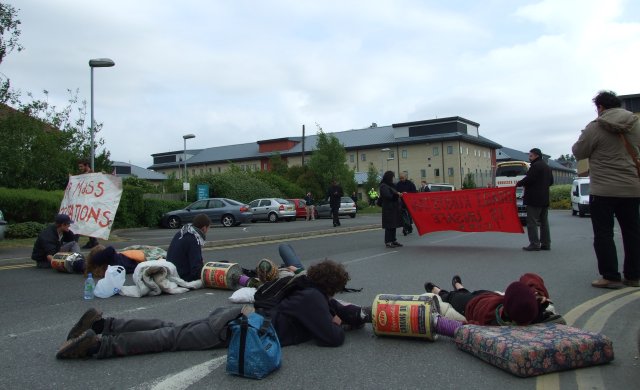The Colnbrook blockade
imc-uk-features | 18.05.2009 10:40 | Iraq | Migration
For the second time in less than two months, anti-deportation campaigners blockaded a detention centre to try and prevent a mass deportation flight to Iraqi Kurdistan. Six activists from the Stop Deportation network locked themselves together on 12th May, using glass and plastic arm tubes attached to heavy concrete barrels, blocking the entrance to Colnbrook detention centre near Heathrow, where some 45 of the deportees were being held. The blockade lasted for over four hours, after which three coaches carrying the deportees left for an undisclosed airport. All six were arrested (two quite violently) for obstruction of the highway.
Colnbrook IRC under Blockade | Blockade of Colnbrook detention centre | Colnbrook blockade ends with 6 arrests | Pictures | Video
Related: Anti-deportation campaigners blockade Tinsley House immigration prison

soon after the start of the blockade
As soon as the blockade was removed by the police cutting team around 12:45pm, three WH Tours and Woodcock coaches were seen leaving the detention centre carrying about 45 deportees. Another 10 or so had been taken from Brook House detention centre at Gatwick earlier this morning. The time, airline and departure airport of the flight have not been disclosed by the Home Office but it is believed to have left Stanstead that afternoon. Six people were taken off the flight following last-minute high court injunctions. Another man, who had not been given Removal Directions but was nonetheless being deported, was also taken off.
The flight was the 9th mass deportation flight to Iraqi Kurdistan in the last 10 months. Iraqis are also deported individually or in groups of two or three on commercial flights such as Royal Jordanian. According to Home Office figures, 632 people have been forcibly deported to Iraqi Kurdistan between 2005 and 2008. With monthly charter flights deporting 50 Iraqis at a time since the beginning of 2009, it is estimated that the figure currently stands at approximately 950.
A similar mass deportation flight to Iraq in March this year was met by campaigners with a similar blockade of Tinsley House detention centre at Gatwick airport, which lasted for six hours and resulted in nine arrests.
Mass deportation flights limit refugees' access to due legal process. The UK Border Agency's Enforcement Instructions and Guidance states that: "charter flights may be subject to different arrangements where it is considered appropriate because of the complexities, practicalities and costs of arranging an operation." Charter flight deportees are told that "removal will not necessarily be deferred in the event that a Judicial Review is lodged". The emphasis is on filling the flight rather than ensuring the appropriate legal avenues have been exhausted. In the case of Iraq charter flights, deportees and their representatives are not even told the date of the flight. On the day of the flight, they are woken up early in the morning and forced to switch off their phones so they are unable to instruct their solicitors to submit last-minute appeals.
Many of those deported to Iraqi Kurdistan had fled the Kurdistan Regional Government authorities, to whose mercy they are being sent back. Last month, a report by Amnesty International revealed "a pattern of abuses" committed by KRG security forces. A 2007 report by Human Rights Watch similarly revealed that KRG security forces "routinely torture and deny basic due-process rights to detainees."
To operate a charter flight, of course, the Home Office contracts a number of private companies. Airlines that are known to have been used include Hamburg International and Czech Airlines. Bus companies to drive people from detention to the airport have included WH Tours and Woodcock coaches. Private security companies used to escort deportees include Group 4 Securicor and SERCO.
imc-uk-features
Comments
Display the following 4 comments